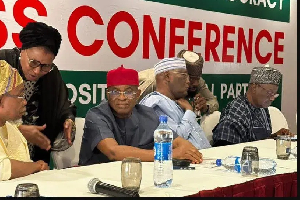The International Service Group (ISG & Partners), the concern reputed for funding the infrastructural development projects of African Governments has unveiled its package for the private sector in Africa.
Speaking at a recent media parley with the Director of Media to ISG & Partners, Mr. Moses Owopade as host, Mr. Mike Tuinstra, Vice President and CFO of International Service Group & Partners informed of the importance of Africa’s private sector development in terms of economic growth, employment and poverty reduction.
Tuinstra explained that the private sector is the part of a country's economic system that is run by private individuals or groups, usually as a means of enterprise for profit rather than the government.
He said the private sector, as the primary driver of economic growth and employment creation, has a central role in poverty reduction and the achievement of the Sustainable Development Goals (SDGs).
For the private sector to drive economic growth, social inclusion and environmental sustainability, he said a favorable business environment, industrial policies and a system of incentives are necessary, adding, that the private sector has a major role to play in the development and uptake of new innovative technologies and business practices.
He noted that where red tape and corruption remain constraints in developing countries, private sector businesses will be essential contributors to the establishment of a circular economy, through more resource efficiency and effectiveness, cleaner production and better waste management, and to the fight against climate change through more energy efficiency and renewable energies.
Tuinstra further stressed that government support in addressing market failures and under-provision of public goods such as new knowledge, technology and information, financial stability, preserving the environment and addressing climate change through various instruments (taxes, subsidies etc.) is crucial.
He divulged that in other continents, the private sector is stronger than the Government sector, submitting however, that the exact opposite is the case in Africa. This he opined, can be considered one of the main reasons Africa is still not developed.
According to him, discussions have long been underway regarding the roles that private sector and industry can play, as well as their relevance to the development agenda, adding that considering the investments required to achieve the SDGs, it becomes clear that the private sector is needed to provide a large share of resources. Hence, he posited, that partnering with the private sector is therefore the foundation of any successful large-scale development strategy.
"It is absolutely critical to build up vibrant, systematic and innovative partnerships with the private sector for the successful implementation of the SDGs”.
Working in public-private partnerships to provide reliable knowledge, information, innovative and scalable solutions, and other multi-stakeholder resources can have a transformational effect," he maintained.
In his words, there are promoters in the private sector, who have excellent ideas to contribute to the development of Africa, but have no idea which criteria they must meet in order to obtain funding for their project.
A brief summary of requested documents are among others feasibility studies, business plans, financial projections and legal documents, adding that the timeline is usually 6 months to 1 year.
"First, the pre-due diligence is done. When the outcome of the pre-due diligence is positive a project term sheet is drawn up and sent to the promoter. No costs are charged for this process. Then comes the due diligence process. Costs are charged for the performance of the due diligence and must be paid in advance.
"After that a contract is drawn up and finally the project will be executed."
To be eligible for funding he insists, all above criteria must be met.
Tuinstra concludes that the production of a professional detailed project plan, one of the services of ISG & Partners in addition to funding and execution on EPC+F is the missing element in the success of African projects.
"An idea without a sustainable plan is just a wish; a professional project plan gives access to funding and execution on a project by project basis, and will ultimately contribute to the implementation of a stronger private sector in each respective country of the African continent”.
"In turn, this will enable Africa to reach its full growth potential in terms of economic growth, creating employment and poverty reduction'' he concluded”.
Business News of Thursday, 24 September 2020
Source: Moses Owopade, Contributor













